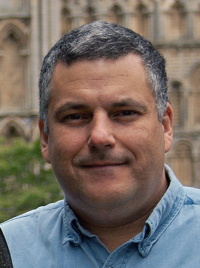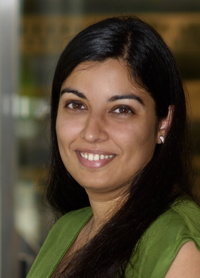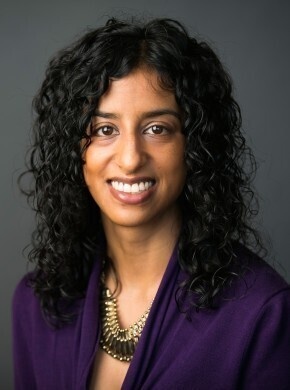The Reed College Public Policy Lecture Series continues its annual tradition of bringing compelling speakers to campus to address important issues of politics, policy, and political change.
This spring’s Public Policy Lecture series explores the past, present, and future ends of empires in South Asia. During the series, lecturers will examine contemporary warlordism in Afghanistan, and “strongman” governance in Afghan provinces post-2001; the imperial and multinational armies that fought in Asia during the Second World War, with a focus on the British Indian army in the Burma campaign; and cross-ethnic political coalitions in the context of the rise of strong ethnic identities in colonial and post-colonial India.
All events are free and open to the public.
Tarak Barkawi
"Soldiers of Empire: The Indian Army in World War II"
Tuesday, February 20
7 p.m., Vollum lecture hall
 How are soldiers made? Why do they fight? Reimagining the study of armed forces and society, Tarak Barkawi, reader in international relations at the London School of Economics and Political Science, examines the imperial and multicultural armies that fought in Asia during the Second World War, especially the British Indian Army in the Burma campaign. Going beyond conventional narratives, Barkawi studies soldiers in transnational context, from recruitment and training to combat and memory. Drawing on history, sociology, and anthropology, he critiques the “Western way of war” from a postcolonial perspective. Barkawi reconceives soldiers as cosmopolitan, their battles irreducible to the national histories that monopolize them.
How are soldiers made? Why do they fight? Reimagining the study of armed forces and society, Tarak Barkawi, reader in international relations at the London School of Economics and Political Science, examines the imperial and multicultural armies that fought in Asia during the Second World War, especially the British Indian Army in the Burma campaign. Going beyond conventional narratives, Barkawi studies soldiers in transnational context, from recruitment and training to combat and memory. Drawing on history, sociology, and anthropology, he critiques the “Western way of war” from a postcolonial perspective. Barkawi reconceives soldiers as cosmopolitan, their battles irreducible to the national histories that monopolize them.
Tarak Barkawi is the author of Soldiers of Empire: Indian and British Armies in World War II (2017) and Globalization and War (2005). He has written on colonial armies, small wars, the Cold War in the Third World, and on counterinsurgency and the War on Terror.
Sponsored by the Munk-Darling Lecture Fund in International Relations.
Madhavi Devasher
"The Ends of Ethnic Identity: The Politics of Electoral Choice in Post-Colonial India"
Tuesday, March 6
7 p.m., Vollum lecture hall
 “Indian voters don’t cast their vote, they vote their caste.” This commonly heard quip about Indian elections suggests that ethnic affiliations—which, in India, includes caste and religion—are inflexible determinants of voting behavior. Other multiethnic democracies are often thought to experience similar challenges. Devasher’s talk first examines why caste and religion impact electoral choices in post-colonial India, before arguing that this logic does not always hold. She explores the complex ways in which parties and voters instrumentally use and discard ethnicity and discusses the implications of these dynamics for political stability and social equality in India.
“Indian voters don’t cast their vote, they vote their caste.” This commonly heard quip about Indian elections suggests that ethnic affiliations—which, in India, includes caste and religion—are inflexible determinants of voting behavior. Other multiethnic democracies are often thought to experience similar challenges. Devasher’s talk first examines why caste and religion impact electoral choices in post-colonial India, before arguing that this logic does not always hold. She explores the complex ways in which parties and voters instrumentally use and discard ethnicity and discusses the implications of these dynamics for political stability and social equality in India.
Madhavi Devasher is an assistant professor of political science at the University of New Hampshire specializing in ethnic politics, especially in South Asia. She received her PhD in Political Science from Yale University and her BA from Stanford University.
Sponsored by the Elizabeth C. Ducey Political Science Lecture Fund.
Dipali Mukhopadhyay
"The Palace Politics of State-Building in Post-2001 Afghanistan"
Wednesday, April 11
7 p.m., Vollum lecture hall
 Models of foreign-led state-building and counterinsurgency anchor their prescriptions for governance in the Weberian ideals of a monopoly over the legitimate use of violence and the emergence of rational, rule-based bureaucracy. These are touchstones for our modern understanding of statehood, government, and governance. But the palace politics of weak statehood are not about the delivery of services to far-flung local communities; nor are they about the construction of an institutionalized technocracy. The palace politics of weak statehood are about the apportioning of power as a means of managing competition. As a result, Western efforts at governance promotion are often out of alignment with the interests of post-conflict regimes, which are seeking survival in highly competitive surroundings. Mukhopadhyay will revisit the Karzai regime’s management of gubernatorial appointments in order to unearth the logic of rule that has been driving Afghan state formation since 2001.
Models of foreign-led state-building and counterinsurgency anchor their prescriptions for governance in the Weberian ideals of a monopoly over the legitimate use of violence and the emergence of rational, rule-based bureaucracy. These are touchstones for our modern understanding of statehood, government, and governance. But the palace politics of weak statehood are not about the delivery of services to far-flung local communities; nor are they about the construction of an institutionalized technocracy. The palace politics of weak statehood are about the apportioning of power as a means of managing competition. As a result, Western efforts at governance promotion are often out of alignment with the interests of post-conflict regimes, which are seeking survival in highly competitive surroundings. Mukhopadhyay will revisit the Karzai regime’s management of gubernatorial appointments in order to unearth the logic of rule that has been driving Afghan state formation since 2001.
Dipali Mukhopadhyay is Assistant Professor at Columbia University School of International and Public Affairs, where she is a faculty affiliate of the Saltzman Institute of War and Peace Studies. She recently published the book Warlords, Strongman Governors, and State Building in Afghanistan (Cambridge, 2014). Her current work on Afghanistan builds on her first book with a study of palace politics during the Karzai and Ghani presidencies. Her writings have been featured in publications such as the Carnegie Endowment for International Peace, Foreign Policy, U.S. Institute of Peace, U.S. News & World Report, and the Washington Post's Monkey Cage Blog.
Sponsored by the Elizabeth C. Ducey Political Science Lecture Fund.